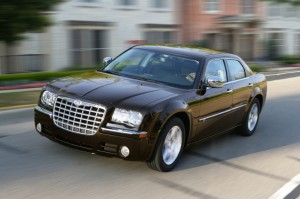
The 2010 Chrysler 300C is one of the many vehicles covered by the maker's new 60-Day Test Drive.Chrysler will let buyers unhappy with its latest products return them, for up to 60 days, and get a full refund. The 60-day Test Drive program will also cover a motorist’s first two monthly payments, up to $1,000.
The program, which echoes ones launched by General Motors and Hyundai, was originally limited to just Chrysler’s two minivan models, the Chrysler Town & Country and Dodge Caravan. It will now include most Chrysler, Dodge, Jeep and Ram products from the 2010 model-year, but notably excludes the all-new 2011 Jeep Grand Cherokee, which is just reaching showrooms.
“With this pledge consumers will have the confidence to know they made the right purchase or they can return the vehicle no questions asked,” said Fred Diaz, Chrysler’s top sales executive and president of the Ram truck brand.
Chrysler’s sales have been picking up in recent months, rising 32% in June, but things were slow, earlier in the year, and the maker needs a boost to help it get rid of those 2010 models before it launches the critical 2011 model-year. At the end of June, there was a 59-day supply of vehicles on Chrysler dealer lots, though that is well below the 71-day supply the maker was weighed down by when it emerged from bankruptcy a little more than a year ago.
The latest program will permit a motorist to buy a vehicle and decide, for up to 60 days, whether they like it. If not, it can be returned for a full refund. The program does not require the buyer to show that they have lost their job, as was the case with the Hyundai Assurance Program.
But Chrysler is hoping that the new return policy will help drive up showroom traffic – especially when combined with an assortment of new incentives and the maker’s annual “Tent Sale. At Dodge, for example, a shopper can choose between the 60-Day Test Drive, 0% financing for up to 60 months or $3,000 in cash. Incentives on some Chrysler products are now running as high as $4,000.
Industry analysts have been warning that incentives could heat up if the U.S. market doesn’t continue to recover, and June sales were clearly a disappointment. The big concern is that Chrysler and other makers could wind up in another profit-eating rebate war, something that most makers had pledged to avoid coming out of last year’s industry meltdown.
